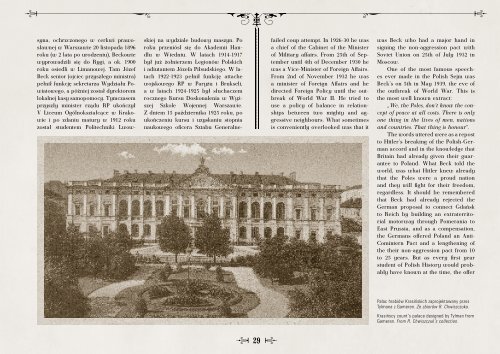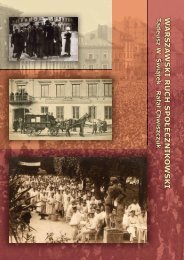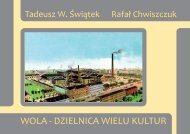Create successful ePaper yourself
Turn your PDF publications into a flip-book with our unique Google optimized e-Paper software.
syna, ochrzczonego w cerkwi prawosławnej<br />
w Warszawie 20 listopada 1896<br />
roku (w 2 lata po urodzeniu), Beckowie<br />
wyprowadzili się do Rygi, a ok. 1900<br />
roku osiedli w Limanowej. Tam Józef<br />
Beck senior (ojciec przyszłego ministra)<br />
pełnił funkcję sekretarza Wydziału Powiatowego,<br />
a później został dyrektorem<br />
lokalnej kasy samopomocy. Tymczasem<br />
przyszły minister rządu RP ukończył<br />
V Liceum Ogólnokształcące w Krakowie<br />
i po zdaniu matury w 1912 roku<br />
został studentem Politechniki Lwow-<br />
skiej na wydziale budowy maszyn. Po<br />
roku przeniósł się do Akademii Handlu<br />
w Wiedniu. W latach 1914-1917<br />
był już żołnierzem Legionów Polskich<br />
i adiutantem Józefa Piłsudskiego. W latach<br />
1922-1923 pełnił funkcję attache<br />
wojskowego RP w Paryżu i Brukseli,<br />
a w latach 1924-1925 był słuchaczem<br />
rocznego Kursu Doskonalenia w Wyższej<br />
Szkole Wojennej Warszawie.<br />
Z dniem 15 października 1925 roku, po<br />
ukończeniu kursu i uzyskaniu stopnia<br />
naukowego ofi cera Sztabu Generalne-<br />
29<br />
failed coup attempt. In 1926-30 he was<br />
a chief of the Cabinet of the Minister<br />
of Military aff airs. From 25th of September<br />
until 4th of December 1930 he<br />
was a Vice-Minister of Foreign Aff airs.<br />
From 2nd of November 1932 he was<br />
a minister of Foreign Aff airs and he<br />
directed Foreign Policy until the outbreak<br />
of World War II. He tried to<br />
use a policy of balance in relationships<br />
between two mighty and aggressive<br />
neighbours. What sometimes<br />
is conveniently overlooked was that it<br />
was Beck who had a major hand in<br />
signing the non-aggression pact with<br />
Soviet Union on 25th of July 1932 in<br />
Moscow.<br />
One of the most famous speeches<br />
ever made in the Polish Sejm was<br />
Beck’s on 5th in May 1939, the eve of<br />
the outbreak of World War. This is<br />
the most well known extract:<br />
„We, the Poles, don’t know the concept<br />
of peace at all costs. There is only<br />
one thing in the lives of men, nations<br />
and countries. That thing is honour”.<br />
The words uttered were as a repost<br />
to Hitler’s breaking of the Polish-German<br />
accord and in the knowledge that<br />
Britain had already given their guarantee<br />
to Poland. What Beck told the<br />
world, was what Hitler knew already<br />
that the Poles were a proud nation<br />
and they will fi ght for their freedom,<br />
regardless. It should be remembered<br />
that Beck had already rejected the<br />
German proposal to connect Gdańsk<br />
to Reich by building an extraterritorial<br />
motorway through Pomerania to<br />
East Prussia, and as a compensation,<br />
the Germans off ered Poland an Anti-<br />
Comintern Pact and a lengthening of<br />
the their non-aggression pact from 10<br />
to 25 years. But as every fi rst year<br />
student of Polish History would probably<br />
have known at the time, the off er<br />
Pałac hrabiów Krasińskich zaprojektowany przez<br />
Tylmana z Gameren. Ze zbiorów R. Chwiszczuka.<br />
Krasińscy count’s palace designed by Tylman from<br />
Gameren. From R. Chwiszczuk’s collection.




